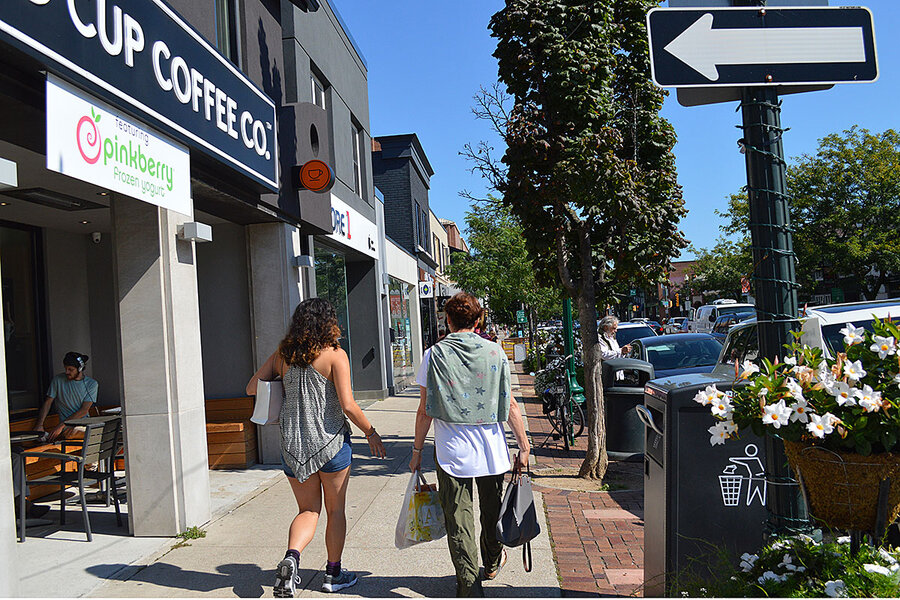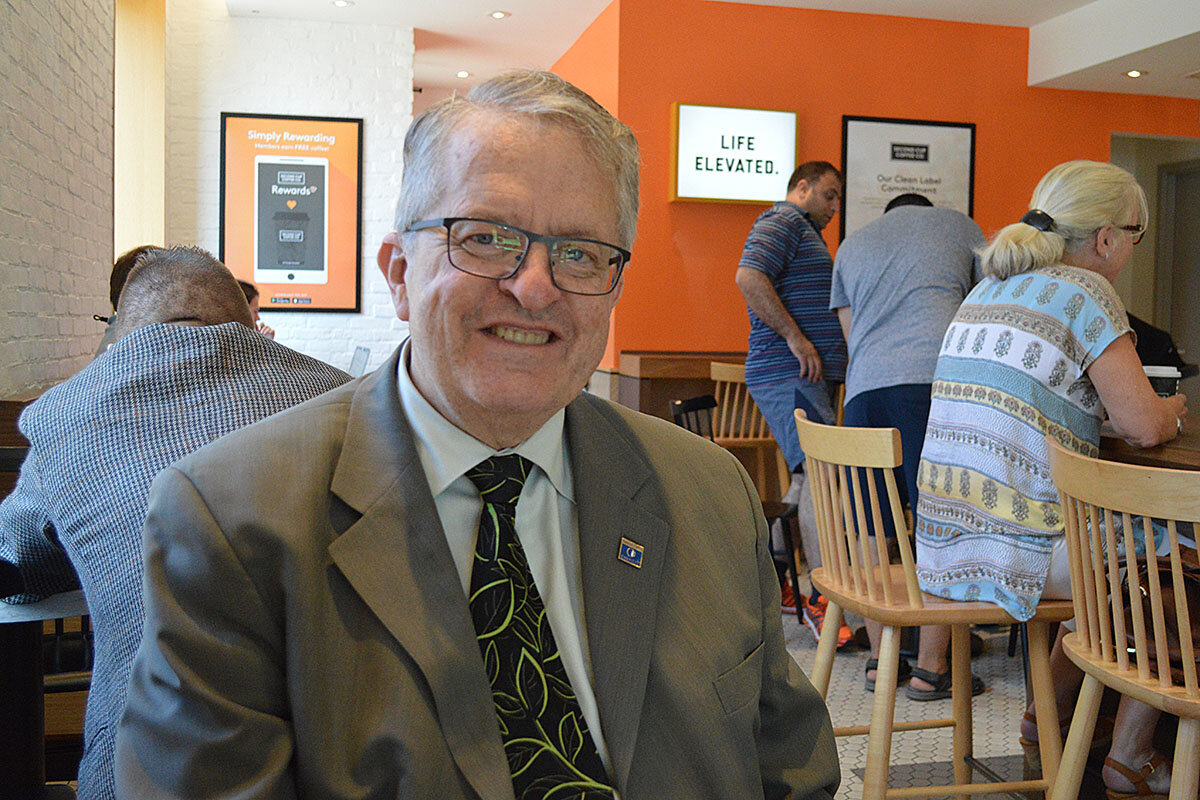As Canada legalizes cannabis, concerns mount over challenges, uncertainties
Loading...
| Oakville, Ontario
At a coffee shop off the pretty main street of Oakville, an affluent community just southwest of Toronto on Lake Ontario, Mayor Rob Burton points to the table to his right where a mother and two young boys laugh together over a computer screen. On the patio outside, young mothers have parked their strollers as they sip on lattes.
“This is a family town,” says Mr. Burton.
And that’s why he says if he is re-elected this fall, he plans to initially ban retail cannabis shops in Oakville, after cannabis becomes legal for recreational use next month. This very chain, Second Cup, announced plans to convert some of their locations into cannabis retail stores.
Why We Wrote This
Legalization of marijuana is only the first step of introducing it to society as a recreational substance. Many issues, like how it will be sold and what effect it will have on communities, remain. Part two of two.
As marijuana emerges from basement growing rooms and underground sales, towns are grappling with how to regulate a substance that has been illegal for most people’s lifetimes.
Legalization of recreational pot has many towns buzzing with the possibilities, from job creation to tourism potential. Given the hype around the “green rush,” it’s easy to overlook the many mixed feelings surfacing about legalization. Among the most conflicted are mayors worried about the pace of change, even as they face criticism for being old-fashioned or failing to learn history lessons from prohibition.
Support for legalization of recreational cannabis has grown since it was legalized for medicinal use in 2001, with up to two-thirds of respondents supporting it. But polls also show significant doubts about how ready the provinces are to implement the law and whether it will have its intended effect of undercutting the black market or keeping the substance away from kids. More abstract are nagging concerns that it’s the wrong priority to be focusing on.
“This whole cannabis legalization is going to create challenges. And I’m not so sure it’s the best thing for society right now,” says Randy Woroniuk, mayor of Gimli, Manitoba, a resort and retirement town. “We have other challenges, and introducing another mind-altering substance I don’t think, in my mind, is conducive to a better society.”
Worried about the unknowns
Mayor Woroniuk's experience navigating the situation shows how fraught the debate is on the local level.
When municipalities in Manitoba voted in December on whether they’d allow retail cannabis stores in their jurisdictions, the Gimli town council was the first to say no – “with caveats,” Woroniuk says. Chief among concerns were questions about how much it would cost the town and what they stood to gain.
He says the hate mail was relentless. “I was accused of being too religious to make a proper decision, because I go to church every Sunday.”
Eventually the province clarified the process for distribution and sales, and Gimli, like municipalities around the country, decided to allow storefronts to open after all. But Woroniuk remains unconvinced about the path of legalization. “If they were going to do something, they should have just decriminalized it, they shouldn't have legalized it, [but] made it a parking ticket-type offense if you have so much,” he says.
Each province sets its own rules on distribution and sales. Cannabis will only be available online in Ontario on Oct. 17, with private retailers coming into the market in the spring. Councils can’t ban the use of marijuana, but they have a window in which they can say no to brick-and-mortar stores.
The mayor of Markham says he will opt out of allowing sales in his city north of Toronto. So has the mayor of neighboring Richmond Hill, though he says he is awaiting information about how the “opt-out” clause will work in Ontario before commenting further.
Dan Malleck, an expert in alcohol regulation and prohibition at Brock University in St. Catharines, Ontario, says that the language he hears today about cannabis has many parallels with prohibition in 19th century Canada, where municipalities or cities could vote themselves “dry.” He says many such places saw little decrease in drunkenness, and some even saw increases.
He says the “family town” argument resonated then. And it does today because of the perception of cannabis “as an especially morally problematic substance that will damage the family,” he says.
‘We'll watch them work it out’
But just like prohibition did, bans will fail if a vast majority don’t support them. And support for legalization generally suggests that the public won't approve of a ban on retail stores. “Our historic understanding is not a perfect comparison, but certainly it has a lot of the same elements of popular will, and people who want it are going to get it anyway,” Dr. Malleck says. “This just encourages illegality.”
Caryma Sa’d, a cannabis lawyer from Toronto, says she thinks that many town councils are comprised of members who adhere to old schools of thought about “reefer madness.” “I think that is hard to shake,” she says, “and is the source of this gut reaction to ban it, or to opt out.”
In Oakville, Burton rejects comparisons to prohibition. He says cannabis is going to be legal, thus he abides by the law. He says there are simply too many unknowns for municipalities, including details such as who will decide where stores go or what the operating hours will be. He says the town is better off opting out during this experimental stage.
“I think my residents will be happy to stand back, watch them work it out, … and when they have it all settled, we’ll opt in. Maybe with a referendum,” he says.
Oakville resident Colleen Sullivan says she has mixed feelings about legalization but is sure she doesn’t want cannabis retail stores in her town, which this summer was voted the best place to live in Canada. “People come to live in Oakville for a reason. It’s 45 minutes from the city,” she says on her way to shop on the main street, where flower pots hang from the lampposts.
She’s not alone in worrying about how legalization might affect the town’s quality of life. A DART Insight survey released in June found that 53 percent of Canadians fear the impact that marijuana will have on their community.
Ms. Sullivan says she is not naive; she knows kids can access drugs whether there is a retail store in the town or not. Still, she thinks it's better not to make it easier than it already is – especially in an affluent area where kids have disposable income. “That stuff can stay in the city,” she says. “We’re here to get away from that.”
This is the second part of a two-part package exploring how Canada’s legalization act affects communities across the country. Part one explored how communities are capitalizing on the legalization of cannabis by using it to generate new jobs and taxes.







